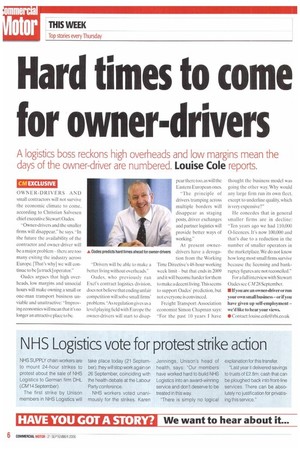Hard times to come for owner-drivers
Page 6

If you've noticed an error in this article please click here to report it so we can fix it.
A logistics boss reckons high overheads and low margins mean the days of the owner-driver are numbered. Louise Cole reports.
CM EXCLUSIVE OWNER-DRIVERS AND small contractors will not survive the economic climate to come. according to Christian Salvesen chief executive Stewart Oades.
"Owner-drivers and the smaller firms will disappear," he says. "In the future the availability of the contractor and owner-driver will be a major problemthere are too many exiting the industry across Europe. [That's why] we will continue to be [a truck] operator."
Oades argues that high overheads, low margins and unsocial hours will make owning a small or one-man transport business unviable and unattractive: "Improving economies will mean that it's no longer an attractive place to be. "Drivers will be able to make a better living without overheads."
Oades, who previously ran Exel's contract logistics division, does not believe that ending unfair competition will solve small firms' problems. "As regulation gives us a level playing field with Europe the owner-drivers will start to disap pear there too, as will the Eastern European ones.
"The principle of drivers tramping across multiple borders will disappear as staging posts, driver exchanges and partner logistics will provide better ways of working."
At present ownerdrivers have a derogation from the Working Time Directive's 4-8-hour working week limit but that ends in 2009 and it will become harder for them to make a decent living. This seems to support Oades' prediction, but not everyone is convinced.
Freight Transport Association economist Simon Chapman says: "For the past 10 years I have thought the business model was going the other way. Why would any large firm run its own fleet. except to underline quality, which is very expensive?
He concedes that in general smaller firms are in decline: "Ten years ago we had 110,000 0-licences. It's now 100,000 and that's due to a reduction in the number of smaller operators in the marketplace. We do not know how long most small firms survive because the licensing and bankruptcy figures are not reconciled."
Fora full interview with Stewart Oades sec CM 28 September.
• If you are an owner-driver or run your own small businessor if you have given up self-employment we'd like to hear your views.
• Contact: louise.cole@rbi.co.uk




























































































































































































